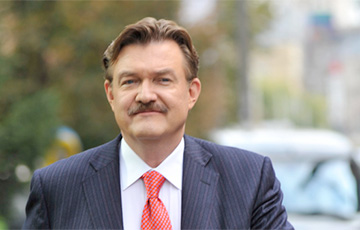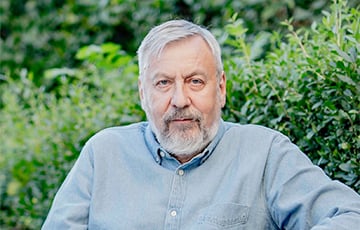Evgeny Kiselev On Changes In Russian Government: This Is A Black Box
14- 15.05.2024, 16:12
- 21,600

What do the Kremlin policies and the “What? Where? When?” intellectual quiz have in common?
The Free Russia Forum held an international conference “Anti-Putin Coalition. Conditions for victory and liquidation of the Putin regime.” The conference took place on May 14.
The event took place against the backdrop of high-profile reshuffles in the highest echelons of Russian power: Putin appointed Andrei Belousov as the new Minister of Defense, and the former head of this department, Sergei Shoigu, as head of the Security Council. Former head of the Security Council Nikolai Patrushev became Putin’s aide, and the former security guard of the head of the Kremlin, governor of the Tula region Alexey Dyumin, was appointed second aide.
What could these changes mean? On the sidelines of the event, a correspondent for the Charter97.org website spoke with the famous journalist and political observer Evgeniy Kiselyov about this:
— Options may be different. It is likely that Sergei Shoigu was removed from the post of Russian Defense Minister because Putin is dissatisfied over his involvement in corruption.
There may be other reasons for this. Maybe he just took on too much. You know, very often people are fired for talking too much, let’s say, “they slap their tongue around the perimeter.”
If we talk about his appointment to the post of Secretary of the Security Council, perhaps this was disgrace. And, perhaps, they deliberately decided to replace Nikolai Patrushev, who in recent years has become too strong a figure, as some argue, with a weaker person. The Security Council played different roles in different periods of its existence. There were times when it served as an alternative center of power and influence in Russia. There were times when the Secretary of the Security Council became a decorative figure, and the Security Council turned into a personnel sewage, a sinecure that did not decide anything.
Patrushev was once transferred from the FSB to the Security Council. It was perceived as an honorable retirement, but he started to gain strength, and now he's been removed. Why? We do not know. Maybe Patrushev got sick. At one time he had serious health problems, and then he pulled himself together and again became an active senior official. Maybe he's sick again. God knows.
Now it is very difficult to come up with any analyzes and forecasts. Only practice will show what these new appointments, resignations, and reshuffles mean. But I absolutely agree with Alfred Koch (former Deputy Prime Minister of the Russian Federation — editor's note), who several times recently brought up the idea that during the entire period of Vladimir Putin's presidency, personnel changes turned out to have changed little in the general political course of Russia.
There was a constant movement to strengthen the role of the state in the economy, to curtail private initiative, to limit the democratic rights and freedoms of citizens, to strengthen the anti-Western component in foreign policy, and to increasingly tighten ideological control. No matter who held any positions there, this trend in economic and foreign policy, in the defense sector, in ideology and culture did not change in any way.
I think that until we see some dramatic changes in an unexpected direction, these personalities do not have much significance.
— And the appearance of an economist as head of the Ministry of Defense?
— This is insignificant. We already had economists in state positions. For example, Marshal Ustinov was not a professional military man.
Sergei Ivanov, who headed the Russian Ministry of Defense, Serdyukov — all of them were not professional military men. In fact, Russia had only one professional military man as Minister of Defense — Marshal Sergeev. It was a long time ago when Putin was just starting out.
Putin sort of inherited Sergeev; he was a man of Yeltsin origin. Since then, there have been no pure professional military men in this position.
— What can you say about the rise of Putin’s security guard Dyumin?
— It is not clear what is more important: to be a governor of the Tula region, where a huge number of enterprises of the military-industrial complex are concentrated, or to be Putin’s aide. Again, we'll see. It is likely that by bringing Dyumin closer to himself, Putin, on the contrary, is establishing tighter control over him.
It’s one thing when he is the head of a large region where there are a huge number of enterprises, there are military units and formations. Another thing is that he is an aide who has his own office and two assistants, and not the entire apparatus of the regional government.
You know, this is a controversial issue: whether it is a promotion or not. Rather, moving horizontally and, of course, the position of aide to the president gives some new powers and opportunities, but many opportunities are lost.
After all, a regional governor is a person who has their own independent base of power and influence, including economic one.
— To sum up, are all the experts’ conclusions from the reshuffles in the highest echelons of Russian power just fortune telling?
— I’ve said it many times in the past, I can repeat it.” Kremlin policy is a “black box”. We don't know what's going on inside there. Sometimes this “black box” opens, and we say, “How come we didn’t guess?”
You know, it’s like in the intellectual game “What? Where? When?”, when the black box is taken out and it is unknown what is inside. Sometimes it is absolutely impossible to guess, but when it is opened, we exclaim: “Well, how come we did not guess it! It was so obvious.” Kremlin affairs are also arranged this way.











